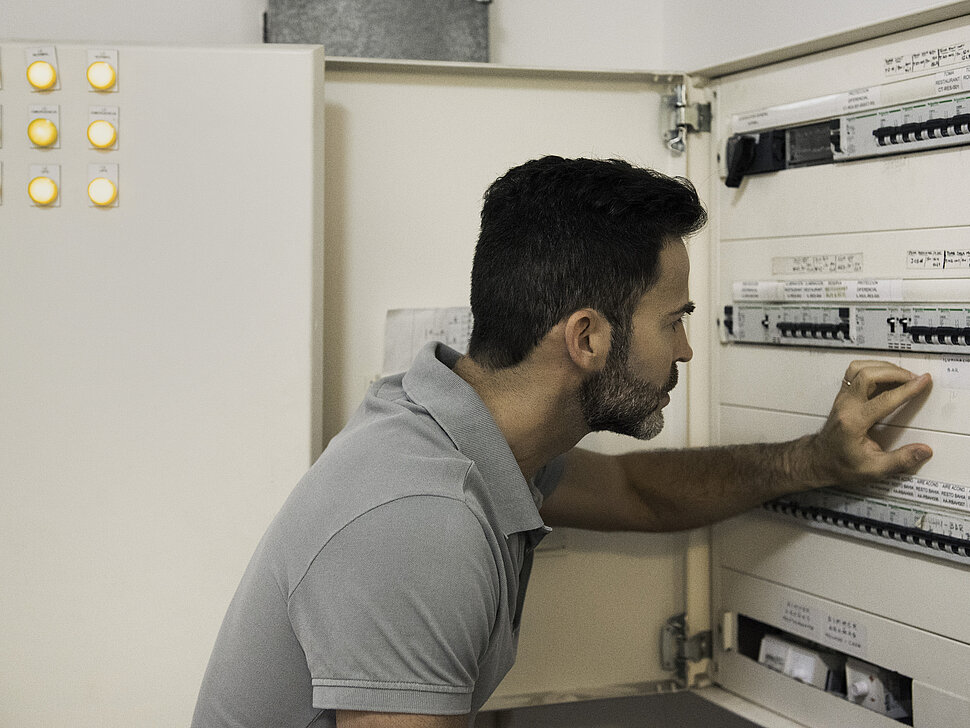Reading time: 13 min
Keeping an Emergency Food Stockpile – Here’s How
The noise is unavoidable: bright and early this morning the construction crews at the corner started work on the canalization. But before they started their machines, they turned off the water supply for the whole block, as announced. Fortunately, that’s not a problem if you’ve kept yourself a small stockpile of food supplies. A few bottles of tap water – filled fresh the day before – are plenty for making coffee or cooking pasta.
This principle of being prepared applies equally to crisis situations where water has to be turned off for a longer period of time or supermarkets are closed, for instance due to a power outage, or because you can’t get to the store due to a surprise isolate-at-home notice. With the right food supplies, you can make it through such situations without trouble. Read on for more on what all an emergency food supply should have and other factors you should consider.
Am I Building a Stockpile or Am I Panic Buying?
Putting together a food stockpile for emergencies is a sensible measure to take. The key thing here is the question of quantity. If the stockpile is considerably larger than what the person themselves needs, this can mean that there won’t be enough food or medication available to others. To make sure there’s enough for everyone, it is therefore important not to panic buy in large volumes, but rather to store a sensible amount of extra supplies. Not to mention, it’s a lot kinder on the wallet if you don’t buy everything all at once and instead add to the stockpile step by step – each time you go shopping simply buy one or two things for the emergency supplies. Just going by these tips will mean you’re headed in the right direction.
What Makes a Good Food Stockpile
Is there such a thing as the perfect food stockpile that is truly ideal for every person? Naturally the answer here is no. Some people like to eat meat, others prefer to eat vegan, others orient their diet toward their religion, and still others are allergic to certain foods. Everybody is different and everybody eats differently. But a few basic guidelines still apply to creating a food stockpile. And it’s not so much a question of the specific foods, but of the fundamentals:
10 days To be prepared for a crisis situation, we recommend creating a stockpile of food and beverages meant to last ten days.
2 liters Per day, every person needs approximately two liters of liquid (incl. 0.5 liters for cooking). You should include water, juice, and other drinks in the food store. Alcoholic beverages do not serve the right purpose here.
2,200 kcal The average adult requires 2,200 calories per day. What this translates to in practical terms is illustrated below in our sample shopping lists.
7 Tips for Creating an Emergency Food Store
Below are a few practical tips you can use when putting together a food store for emergencies to make sure it is simple to create and easy to store:
Step by step Don’t buy everything all at once; instead, simply put one extra package of something in your cart and build up the stockpile little by little.
What’s your pleasure? Only buy food that the individuals in your household enjoy and have no difficulty eating.
Don’t let the stockpile go to waste Make sure the stored food isn’t wasted by regularly checking perishable items like meat or vegetables for their expiration date. Where necessary, use these up – and buy replacements.
Replacements to the back Items that were bought later should be placed farther to the back so that older food is used up first.
Store it correctly As a rule, the best storage for food is somewhere cool, dry, and dark.
Cooling and cooking not needed In an emergency, the power and water may be out. The food in your stockpile should therefore be able to keep well without refrigeration and be consumable without having to be cooked. In the colder months, you can use your balcony or outdoor space to keep perishable items cool. Make sure everything is well packaged so that insects or small animals can’t get into things.
Pets get hungry too If you own a cat, dog, or other pet, make sure there is sufficient food, water, litter, medications, and anything else your animal companions might need.
Sample Shopping Lists for Every Kind of Household
For meat eaters
Beverages: 20 liters
Grains, bread, potatoes, pasta, rice: 3,5 kg
Vegetables, mushrooms, beans/lentils: 4 kg
Fruit, nuts: 2,5 kg
Milk, dairy products: 2,6 kg
Fish, meat, eggs, or powdered egg: 1,5 kg
Fats, oils: 357 g
Other: As desired
For vegetarians
Beverages: 20 liters
Grains, bread, potatoes, pasta, rice: 3,3 kg
Vegetables, mushrooms, beans/lentils: 4 kg
Fruit, nuts: 2,5 kg
Milk, dairy products: 2,5 kg
Fish/meat substitute, eggs, or powdered egg: 1,1 kg
Fats, oils: 330 g
Other: As desired
For vegans
Beverages: 20 liters
Grains, bread, potatoes, pasta, rice: 3,3 kg
Vegetables, mushrooms, beans/lentils: 4 kg
Fruit, nuts: 2,5 kg
Vegan milk, vegan non-dairy products: 2,5 kg
Vegan meat substitute or other protein alternatives: 1,1 kg
Fats, oils: 330 g
Other: As desired
For people who follow a vegan diet, there is currently no detailed list available from the German Federal Ministry of Food and Agriculture. However, the list for vegetarians can serve as a basis. Here, the items under “Milk, dairy products” and “Eggs, substitutes for meat/sausage/fish” will need to be replaced with vegan alternatives.
For muslims
Beverages: 20 liters
Grains, bread, potatoes, pasta, rice: 3,5 kg
Vegetables, mushrooms, beans/lentils: 4 kg
Fruit, nuts: 2,5 kg
Milk, dairy products: 2,6 kg
Fish, meat, eggs, or powdered egg: 1,5 kg
Fats, oils: 357 g
Other: As desired
For people who follow a Muslim diet, there is currently no detailed list available from the German Federal Ministry of Food and Agriculture. However, the list linked below can serve as a basis. Under the section “Eggs, substitutes for meat/sausage/fish,” the item “Aged sausage (e.g. salami)” and “Bockwurst, canned” will need to be replaced with halal alternatives.
Additional Tips for Shopping Lists
Beverages: including 0.5 liters per day for cooking
Grains, bread, potatoes, pasta, rice: choose bread that keeps for a long time, such as packaged whole-grain bread, rusk toast, or crispbread.
Vegetables, mushrooms, beans/lentils: remember that for dried products, you will need extra water.
Fruit, nuts: canned or preserved fruit will keep longer. Fresh fruit should be chosen to keep well for as long as possible, such as apples or oranges.
Fish, meat, eggs, or powdered egg: fresh eggs only keep for a few weeks after laying; powdered egg, for instance, can be stored for several years.
Other: be it sugar or flour, jam, canned stews, powdered mashed potato mix, candy, or salted pretzel sticks – it’s all up to you.
Calculating Your Needs: Your Personalized Shopping List
Two factors especially are key for deciding how much food you should add to your emergency stockpile: for how many days is it meant to last? And for how many people will it be? Both factors can be entered as needed into the food store calculator
provided by the German Federal Ministry of Food and Agriculture. It will use them to calculate your personalized shopping list quickly and easily.
How to Keep Food Fresh Longer
There are a variety of ways to extend the storage life of food – and many of them have been around for centuries. For instance, salted or smoked items like fish or meat stay good for several months. Fruit, beans, and lentils can be dried, and freezing food prolongs the storage life of many foods considerably.
One technique that has grown in popularity recently is canning – which maybe you remember from when you were young and grandma or grandpa brought a jar of homemade jam up from the cellar. But canning isn’t just for jams and fruit: it can be used for whole meals, too. This is practical in everyday life as well when you don’t have time to cook something fresh. Plus, should there be a power outage, canned food won’t go bad.
The Food Prep Portal of the German Federal Ministry of Food and Agriculture provides a handy overview of how the storage life of various types of food can be extended.
Space Even in the Smallest of Cupboards
Most people don’t have their own house complete with cellar, pantry, and garage for storing extra food. If you take a close look at your home, even small apartments have enough space for storing an emergency food supply.
The important thing here is that the food is stored correctly. For frozen or cooled items, they naturally need to be stored in the freezer or fridge. Other food can often be stored in a dry, dark, and cool place. This is why the cellar or pantry is such a popular choice. In particular where the cellar is concerned, be sure the food doesn’t get damp and that rodents or other pests can’t get into it. Attics and garages are often too warm, particularly in the summer months, and therefore not the best option.
If you don’t have a cellar or a pantry, extra food supplies can be stored in the kitchen cabinets, for instance. This can even have the advantage that you won’t forget what supplies you have and remember to use things before they go bad. Just remember to restock anything you have used. That said, even a cupboard in the hall, unused space under the bed, or a number of other places can be well suited, just so long as they are dry, dark, and cool.



